Mary Anne Yarde's Blog: The Coffee Pot Book Club , page 84
July 6, 2020
Check out R. J. Parker's fabulous book — Requiem, Changing Times #YoungAdult #scific @RJParke90987826

Requiem, Changing TimesBy R. J. Parker
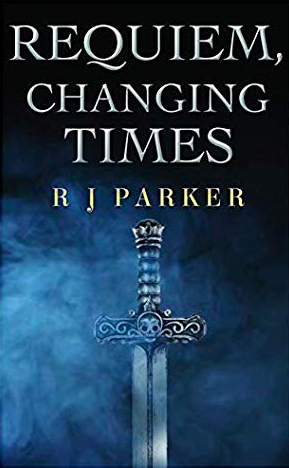
Clint and Corbin are having a weird day. Best friends for life, things are getting a little strange around their town, and at school. When they're followed by a strange man looking for Clint and later attacked by an imp, it makes sense to retreat to the safety of home. But when strangers from another world, Banks and O'Neil, arrive with their medley of allies, things get even weirder. Why are they here? What do they want? And what is The Requiem that everyone keeps talking about? As Clint and his friends and family are drawn deeper into a thrilling adventure, only one thing is for sure. They may not be getting out alive. And class with Mrs Christenson will seem like a walk in the park after this.
The Coffee Pot Book Club
★★★★★
Highly Recommended
Read the full review HERE!
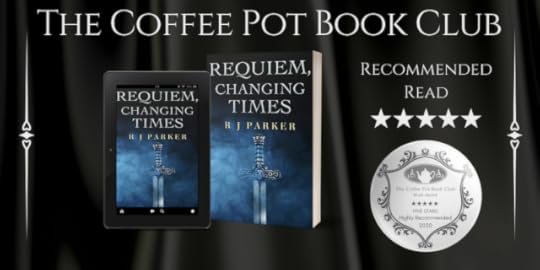
Pick up your copy ofRequiem, Changing TimesAmazon UK • Amazon US
R. J. Parker
 Russell Parker was born in Bountiful, Utah. As his father was safety manager he had to move around until his senior year of high school, when he came to Cache Valley, Utah to stay. He married the most wonderful woman in the world and they are the parents of four fantastic kids, with one crazy dog. Russell played all kinds of sports and was an outdoors man until an accident brought him to writing. A writer since high school, encouragement brought his stories to life.
Russell Parker was born in Bountiful, Utah. As his father was safety manager he had to move around until his senior year of high school, when he came to Cache Valley, Utah to stay. He married the most wonderful woman in the world and they are the parents of four fantastic kids, with one crazy dog. Russell played all kinds of sports and was an outdoors man until an accident brought him to writing. A writer since high school, encouragement brought his stories to life.Connect with Russel: Website • Facebook • Goodreads.
July 5, 2020
#BookReview — Your Origin and Destiny: Explore the Meaning of Life, Time and Creation by Ivan Rudolph #Christian #SpiritualGrowth

Your Origin and Destiny:
Explore the Meaning of Life, Time and Creation
By Ivan Rudolph
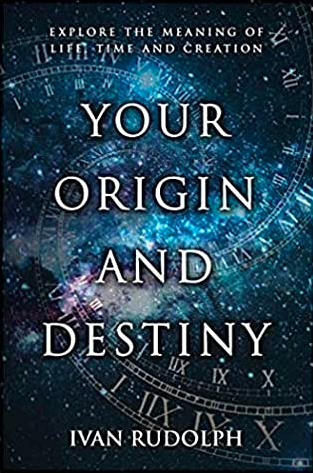
Your Origin and Destiny explores the meaning of Life, Time, Evolution and Creation. Do you ever wonder who you are and why you’re on this Earth? Harnessing science and faith, author of Living Beyond: Making Sense of Near Death Experiences (2015), Ivan Rudolph, offers unique revelations and research that will lead to you expanding your own perspectives in all these areas, even if you have thought them through in the past. You’ll find that Time itself is different and far beyond our assumptions and experiences. Finding answers to life’s most pressing questions will leave you touched, satisfied and excited.
Have you ever wondered whether the fundamental Evolution vs. Creation disagreements can be resolved? They can, and Rudolph analyzes why our own beginnings are entrenched in this issue and how the confusion and distress of this debate has caused many to abandon belief in an eternal God and an afterlife.
This easy-to-read book, Your Origin and Destiny, is a unique and poignant approach to life’s most important questions. You will be inspired by your fresh understanding and vision to pursue a fulfilling life of purpose and love, leading you into an eternal future. Most importantly, you will see yourself in a vibrant new light that will follow you long after the last page.

“Be prepared to change everything you thought you knew about Creation, Time and Evolution.”
Your Origin and Destiny: Explore the Meaning of Life, Time and Creation by Ivan Rudolph is a book that I was very much looking forward to reading. I did not know quite what I was going to get from this book, but I was hoping for some clarity, a reason to hope that perhaps when one died, that wasn’t the end. And that is precisely the kind of book that Rudolph has delivered. Not only does he explore in great detail Near Death Experiences (NDEs) but he also tries to unravel the mystery of Time and the somewhat controversial subject of Creationism.
Rudolph really challenges the very concept of our understanding of what Time is in this book. The Bible states that God created the Earth in seven days, but Rudolph points out it does not state seven Earth days. Thus, he challenges us to think about what Time actually is, how it works, and why it might be different in Heaven, or the cosmos, as it is on Earth. This is not a new concept, and this idea is believed in various branches of Christianity, and it is one I have come across many times. However, Rudolph also challenges the idea that after the seventh day, God stopped creating. He states that throughout the ages, there have been witnesses to miracles that cannot be explained by medical science. Does this mean that if God is performing miracles, then he has not, in fact, stopped creating? Perhaps the seventh day was just a day of rest, and like the majority of us, He went back to work on Monday!
Rudolph also explores in great detail how Time is described in the Bible with his Two-State Process. He uses Isaiah 53:5 as an example to explain his theses. In this particular scripture, it suggests that the crucifixion and resurrection of Jesus had been as Rudolph elegantly states “a done deal”. So, does God in Heaven credit "...an event to have happened already when he decides it in Heaven and scripture records…” and therefore was Jesus’ life and death already decided before the Creation? Rudolph says, yes it was. So, what does that mean for us? Does God have a plan, a date in which we too will die? But we have free will, one may argue, so it is in our power to choose a different date for our passing than the one God has chosen for us, if we so wished it. This book does not answer all the questions one might have about a preordained life with a beginning and end date, but it does make one pause and think about life, death, and what that means on a very individual basis.
One might argue that the Bible from its original origin has been translated in such a way that one takes from it things that are simply not there, but Rudolph goes into great detail about why he thinks that the Two-State Process not only works but is staring us right in the face. Although the Two-State Process sounds, on the face of it, very complicated, Rudolph has explained his ideas with very easy to understand language. This book is not a dry read. One does not need a PHD in Theology to understand it, which I think adds to its appeal.
I was particularly looking forward to Rudolph's understanding and explanations of Near Death Experiences. The Near Death Experience is the only spiritual experience that we have a chance of examining in a scientific way. Of course, there are the sceptics who think that NDEs can be explained in medical terms — Temple Lobe Seizure, Oxygen Deprivation, Hallucinations, or, to put it very simply, a blatant lie told by attention seekers. With a careful, yet lucid account of first-hand testimonies, Rudolph explores a phenomenon that is widespread across the world and consistent in the telling. All of the stories that Rudolph uses for his examples describe a consciousness that is in no way connected to the physical body — a disembodied spirit that is still conscious. The human brain may be a physical system that instructs the body on how to process certain situations and to react accordingly, but Rudolph states that when we look at those who have experienced NDE, it is actually a Biblical experience that they have had and not a scientific one. Rudolph explores how those who have experienced NDEs are changed, usually for the better, from their experience.
Rudolph does explore the agony that people who have experienced an NDE had when they were mocked and ridiculed because one cannot understand the experience unless you have experienced it yourself. Likewise, Rudolph states that those who have heard God speak to them directly must be careful as to who they tell. He also asks his reader to be wary of Satan and his demons, whose mission on Earth is to mislead. However, what this book doesn’t do is scare the reader. If anything, it gives hope which I thought was rather refreshing. This is no damning sermon, and it certainly does not leave a bitter taste in the mouth.
Your Origin and Destiny: Explore the Meaning of Life, Time and Creation by Ivan Rudolph is a book that opens the mind but also offers comfort and hope for those facing death or are struggling with the loss of a loved one. I thought this book was absolutely fabulous from start to finish, and it really made me stop and think. It is certainly a book that deserves to be read, and then read again.
I Highly Recommend.
Review by Mary Anne Yarde.
The Coffee Pot Book Club.
Pick up your copy of
Your Origin and Destiny
Ivan Rudolph
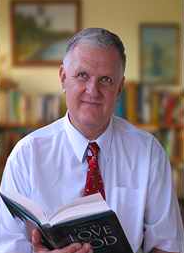
Ivan is an Australian author coming originally from Africa, where one of his early books was turned into a movie. He has recently signed another movie contract for “John Flynn”, the heroic Australian founder of the famous Royal Flying Doctor Service. This latest book, and his previous one “Living Beyond: Making Sense of Near Death Experiences” are themed books dealing with many true life events and not suitable for another movie, BUT “Living Beyond” has already helped many readers who have sent Ivan emails of thanks – and this book will be no different.
Ivan is happily married to Brenda. They have four super children and now six grandchildren and counting.
Connect with Ivan: Website • Facebook • YouTube.
July 1, 2020
Do you love Historical Fiction? The check out Ellen Alpsten's fabulous debut novel — Tsarina #HistoricalFiction #GreatReads @EAlpsten_Author

Tsarina
By Ellen Alpsten

Spring 1699
Illegitimate, destitute and strikingly beautiful, Marta has survived the brutal Russian winter in her remote Baltic village. Sold by her family into household labour at the age of fifteen, Marta survives by committing a crime that will force her to go on the run. A world away, Russia's young ruler, Tsar Peter I, passionate and iron-willed, has a vision for transforming the traditionalist Tsardom of Russia into a modern, Western empire. Countless lives will be lost in the process. Falling prey to the Great Northern War, Marta cheats death at every turn, finding work as a washerwoman at a battle camp. One night at a celebration, she encounters Peter the Great. Relying on her wits and her formidable courage, and fuelled by ambition, desire and the sheer will to live, Marta will become Catherine I of Russia. But her rise to the top is ridden with peril; how long will she survive the machinations of Peter's court, and more importantly, Peter himself?
Praise for Tsarina
"Makes Game of Thrones look like a nursery rhyme..."
Daisy Goodwin
"Alpsten's colourful narrative does full justice to her extraordinary career..."
Sunday Times
"A vivid page-turner of a debut..."
The Times
Excerpt
Prologue
In the Winter Palace, 1725
He is dead. My beloved husband, the mighty Tsar of all the Russias, has died – and just in time. Moments before death came for him, Peter called for a quill and paper to be brought to him in his bed-chamber in the Winter Palace. My heart almost stalled. He had not forgotten, but was going to drag me down with him. When he lost consciousness for the last time and the darkness drew him closer to its heart, the quill slipped from his fingers. Black ink spattered the soiled sheets; time held its breath. What had the Tsar wanted to settle with that last effort of his tremendous spirit? I knew the answer.
The candles in the tall candelabra filled the room with a heavy scent and an unsteady light; their glow made shadows reel in corners and brought the woven figurines on the Flemish tapestries to life, their course faces showing pain and disbelief. Outside the door, the voices of the people who’d stood there all night were drowned out by the February wind rattling furiously at the shutters. Time spread slowly, like oil on water. Peter had pressed himself into our souls like his signet ring in hot wax. It seemed impossible that the world hadn’t careened to a half at his passing. My husband, the greatest will ever to impose itself on Russia, had been more than our ruler. He had been our fate. He was still mine.
The doctors – Blumentrost, Paulsen and Horn – stood silently around Peter’s bed, staring at him, brow beaten. Five kopeks-worth of medicine, given early enough, could have saved him. Thank god for the quacks’ lack of good sense.
Without looking, I could feel Feofan Prokopovich, the Archbishop of Novgorod, and Alexander Menshikov watching me. Prokopovich had made the Tsar’s will eternal and Peter had much to thank him for. Menshikov, on the other hand, owed his fortune and influence to Peter. What was it Peter had said when someone tried to blacken Alexander Danilovich’s name to him by referring to his murky business dealings? ‘Menshikov is always Menshikov, in all that he does!’ That had put an end to that.
Dr Paulsen had closed the Tsar’s eyes and crossed his hands on his breast, but he hadn’t removed the scroll, Peter’s last will and testament, from his grasp. Those hands, which were always too dainty for the tall, powerful body, had grown still, helpless. Just two weeks earlier he had plunged those very hands into my hair, winding it round his fingers, inhaling the scent of rose water and sandalwood. ‘My Catherine’ he’d said, calling me by the name he himself had given me, and he smiled at me. ‘You’re still a beauty. But what will you look like in a convent, shorn, and bald? The cold there will break you, your spirit, even though you’re strong as a horse. Do you know that Evdokia still writes to me begging for a second fur, poor thing! What a good job you can’t write!’ he’d said, laughing.
It had been thirty years since Evdokia had been banished to the convent. I’d met her once. Her eyes shone with madness, her shaven head was covered in boils and scabs from the cold and the filth, and her only company was a hunchbacked dwarf to serve her in her cell. Peter had ordered the poor creature have her tongue cut out, so in response to Evdokia’s moaning and laments, all she was able to do was burble. He’d been right to believe that seeing Evdokia would fill me with lifelong dread. I knelt at Peter’s bedside and the three doctors retreated to the twilight at the edge of the room, like crows driven from a field: the birds Peter had been so terrified of in the last years of his life. The Tsar had called open season on the hapless birds all over his Empire. Farmers caught, killed, plucked and roasted them for reward. None of this helped Peter: silently, at night, the bird would slip through the padded walls and locked doors of his bedchamber. Its ebony wings blotted the light and in their cool shadow, the blood on the Tsar’s hands never dried. His fingers were not yet those of a corpse, but soft, and still warm. For a moment, the fear and anger of these past few months slipped from my heart like a thief in the night. I kissed his hands and breathed in his familiar scent of tobacco, ink, leather, and the perfume tincture that was blended for his sole use in Grasse.
I took the scroll from his hand, it was easy enough to slide it out, although my blood thickened with fear and my veins were coated with frost and rime like branches in our Baltic winter. It was important to show everyone that I alone was entitled to do this – I, his wife, and the mother of his children. Twelve times I had given birth. The paper rustled as I unrolled it. Not for the first time, I was ashamed of my inability to read and I handed his last will to Feofan Prokopovich. At least Menshikov was as ignorant as I. Ever since the days when Peter first drew us into his orbit and cast his spell upon us, we had been like two children squabbling over their father’s love and attention. Batjushka Tsar, his people called him. Our little father Tsar.
Prokopovich must have known what Peter had in mind for me. He was an old fox with a sharp wit, as comfortable in heavenly and earthly realms. Daria had once sworn that he had 3,000 books in his library. What, if you please, can one man do with 3,000 books? The scroll sat lightly in his liver-spotted hands now. After all, he himself had helped Peter draft the decree that shocked us all. The Tsar had set aside every custom, every law: he wanted to appoint his own successor and would rather leave his empire to a worthy stranger over an own, unworthy child.
Pick up your copy of
Tsarina
Amazon UK • Amazon US • Bloomsbury • Waterstones • Indie-Bookshops
Ellen Alpsten
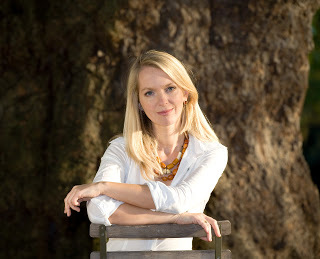
Ellen Alpsten was born and raised in the Kenyan highlands, where she dressed up her many pets and forced them to listen to her stories.
Upon graduating from the 'Institut d'Etudes Politiques de Paris', she worked as a news-anchor for Bloomberg TV London. While working gruesome night shifts on breakfast TV, she started to write in earnest, every day, after work, a nap and a run. So much for burning midnight oil!
Today, Ellen works as an author and as a journalist for international publications such as Vogue, Standpoint, and CN Traveller. She lives in London with her husband, three sons, and a moody fox red Labrador.
'Tsarina' is her debut novel.
For more information about her literary life follow her on social media:
Website • Instagram • Facebook
Check out B.K. Bass' fabulous book — What Once Was Home #sciencefiction #Thriller #GreatReads @B_K_Bass

What Once Was Home
By B.K. Bass
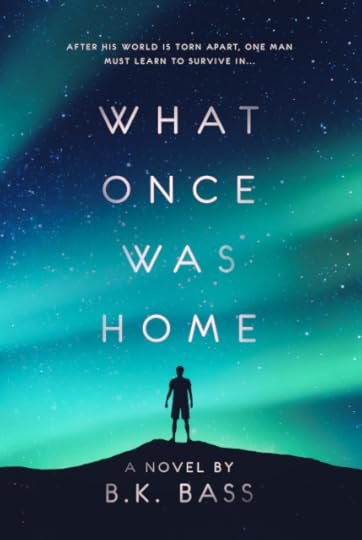
When his world is torn apart, one man must learn to survive in
What Once Was Home.
Jace Cox’s life is changed when an overwhelming alien force invades the Earth with no warning or provocation. In the years that follow, he must not only fight to survive; but also learn what it means to be a man and a leader. As the situation grows more dire, he realizes that his greatest challenge isn’t the alien invaders or even his fellow man; it is holding onto his own humanity despite living in a world gone mad.
Excerpt
He looked up at her, his cold eyes piercing everything he gazed upon. “What’s wrong, mom?”
She thought for a moment, then said, “We’ve lost so much. And there doesn’t seem to be any hope. They’ve been here for eight years, Jace. They still haven’t even tried to talk to us.”
Jace held an old radio, turning it over as if pondering whether it could be salvaged. That was another sign that he had changed. He no longer looked upon anything with joy or curiosity. He only saw what was practical. Every time he looked at something—or someone—he was only evaluating for usefulness. He tossed the radio onto the table in frustration. “Did we talk to ants when we put poison on the mound? How is this any different?”
“How can you say that?” she gasped.
“How is it any different?” he repeated. “It’s obvious they simply thought that we were a nuisance and wanted to get rid of us. Now that there’s so few of us left, we’re not in the way anymore.” Jace looked around the cabin where he had spent the only quality time with his father one last time. “Let’s go, Mom. There’s nothing for us here.”
Pick up your copy of
What Once Was Home
Amazon • Barnes and Noble • Kyanite Publishing • Bookshop
B.K. Bass

B.K. Bass is an author of science fiction, fantasy, and horror inspired by the pulp fiction magazines of the early 20th century and classic speculative fiction. He is a student of history with a particular focus on the ancient, classical, and medieval eras. He has a lifetime of experience with a specialization in business management and human relations and served in the U.S. Army. B.K. is also the Acquisitions Director for Kyanite Publishing, the Editor-in-Chief of the Kyanite Press journal of speculative fiction, and the Writing Department Chair for Worldbuilding Magazine.
Connect with B.K.: Website • Twitter • Facebook • YouTube • Goodreads.

June 30, 2020
Do you love #HistoricalRomance? Check out this fabulous excerpt from Melissa Oliver's #NewRelease — The Rebel Heiress and the Knight @melissaoauthor @MillsandBoon @HarlequinBooks
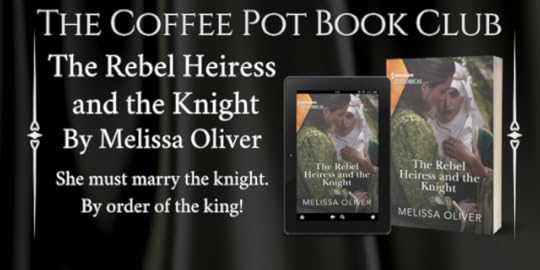
The Rebel Heiress and the Knight
By Melissa Oliver
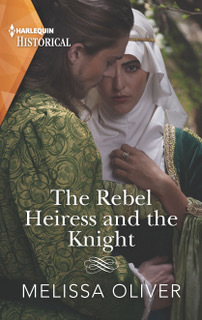
She must marry the knight.
By order of the king!
Widow Eleanor of Tallany Castle knows her people are broken by the taxes demanded by King John. So when she’s ordered to marry Hugh de Villiers, a knight loyal to the king, she’s furious—even if he is handsome! As gallant Hugh begins to heal the scars of Eleanor’s abusive first marriage, she’s even more determined to keep her secret: she is the outlaw the king wants to send to the gallows!
Excerpt
Hugh de Villiers threw her wry, detached look, probably wishing he were far away. She too wished she were anywhere but here in her hall having to listen to Father Thomas. She’d rather be knee–deep in pig manure, or made to stitch a dozen linen shirts or mulch a dozen barrels of apples for cider or to…
An audible collective gasp echoed in the hall and snapped her to attention. She tried to recall a few snatched words heard moments ago. Did she hear correctly or could it be her imagination?
What had Father Thomas just said? ‘Lady Eleanor Tallany...As decreed by King John…Marriage…’
By God she hoped she had imagined it but knew instinctively that she hadn’t. Marriage? Marriage? But to whom? Heart pounding, Eleanor glanced around the room and landed on Sir Hugh de Villiers who looked ashen.
No, no, no! Please not him.
There had to be a mistake! Someone else seemed to voice that…
‘Pardon me, Father, what did you say?’ she whispered as she turned to face her kindly priest, a shadow of concern conveyed in his eyes.
‘Our Lord and sovereign King John has decreed a betrothal between you, my lady, and….’ Father Thomas gulped. ‘Sir Hugh de Villiers. The bringer of this joyous message.’
Her breath caught in her throat as her eyes darted back to Hugh de Villiers, horrified. A ringing noise in her ears drowned out all other sound in the room. She could feel sweat on her brows; her palms clammy. Dear Lord, this could not be happening! Not again. She closed her eyes trying to find an inner strength, her inner calm. She could faintly hear someone calling her, through the dull roar in her head.
‘Lady Eleanor?’ It was Father Thomas’ soothing voice from far away.
‘My lady?’
She opened her eyes and searched his old lined face for support and assistance.
‘Do you understand what this means, Lady Eleanor?’
She dug her fingers into her palm, embracing the sharp pain. She took a deep breath, rolled her shoulders and straightened her spine.
‘I do!’ she ground out in a clear voice, as the hall erupted into cheers, except it seemed, her husband to be. Hugh strode towards her; his jaw clenched tight and knelt in front of her, bowing his head. Just as quickly he got up and without a backward glance stormed out of the hall.
Pick up your copy of
The Rebel Heiress and the Knight
Mills and Book • Harlequin • Amazon UK • Amazon US
Melissa Oliver

Melissa Oliver is from south-west London where she writes historical romance novels. She lives with her gorgeous husband and equally gorgeous daughters, who share her passion for decrepit, old castles, grand palaces and all things historical.
When she's not writing she loves to travel for inspiration, paint, and visit museums & art galleries.
Connect with Melissa:
Twitter • Facebook • Goodreads.
Join #HistoricalFiction author, Steven Veerapen, as he explores The Death of England’s Elizabeth and the Stuart Succession. Pick up Steven's book, Succession, for only 0.99 on #Kindle for a Limited Time. @ScrutinEye @SharpeBooks

End of an Era: The Death of England’s Elizabeth and the Stuart Succession
By Steven Veerapen
Certain moments in history are considered turning points – recognisable shifts from one era to another. One of them is the closure of England’s Tudor age and the birth of its Jacobean period. Armed with the luxury of hindsight, we think of it as inevitable now that, when the famous Virgin Queen died, the throne sat waiting for her Scottish cousin, James, to finally ride south from Edinburgh. However, as I discovered through my research (my primary job involves researching and teaching early modern literature), the succession of King James VI of Scotland as James I of England was not quite as certain as it might seem to us. Or, at least, not until it happened.
 Allegory of Elizabeth
Allegory of Elizabeth
In the first year of Elizabeth’s reign, she famously declared before parliament that ‘this shall be for me sufficient: that a marble stone shall declare that a Queen, having reigned such a time, lived and died a virgin’. This did not deter parliament from trying to convince her to marry and produce an heir and, realising that no one was taking her preference for the single life seriously, she played the marriage game for all it was worth. However, despite her many flirtations and mooted political alliances, the queen did not wed. In the early 1580s, with the departure of her last chance at marriage (for by then she was ageing at a gallop, and the menopause put paid to any useful political alliance), debates about the inevitable were re-energised. They had always existed, of course. Mortality in the Tudor era was a constant worry. Despite her legal prohibition of texts discussing the nation’s future and her haughty demands that parliament not abuse its privilege to discuss such matters, a plethora of texts circulated weighing up the potential candidates. As the 1590s wore on, and as Elizabeth aged, the names of those candidates changed, the pressing question of what would happen on her death became more acute, and the competitors were hotly debated, promoted, wooed, and discounted.
 James VI and I.
James VI and I.
Foremost was James VI of Scotland, a Protestant descendant of Henry VIII’s elder sister, Margaret Tudor. But James was a foreigner – and legal niceties had already been invoked to bar his mother’s claims of inheritance (though the lawyers and Puritans had been satisfied with her execution in 1587) which declared that, as it was a piece of English property, no foreigner had the right to inherit the crown. His cousin, Lady Arbella Stuart, had at least the benefit of English birth, and was seriously considered by those who could stomach another female ruler. Attempts to marry her off to a descendant of Henry VIII’s younger sister, Mary, only served to make her look all the more palatable. In addition, there were Spanish claims through John of Gaunt, Lancastrian claims in the Hastings family, and a clutch of others. All of them, of course, are largely forgotten now – but at the time the issue of the succession was very much alive, even if discussion of it had to take place behind closed doors. It mattered. In the early modern period, the monarch was sovereign – he or she was a modern prime minister, president, and church leader all rolled into one.
 Arbella Stuart.
Arbella Stuart.
The plot of Succession involves Ned Savage, a servant of the Revels Office (which approved or censored London’s plays and oversaw the queen’s private entertainments) and spy, tasked with discovering and foiling a plot to bar King James’s accession. Both he and the plotters, a band of English nationalists stirred up by a corrupt MP, are on the trail of a mysterious secret document containing a dark secret from the king’s past.
In the novel, however, I wanted to explore more than just the plots and politics of those last few weeks of Elizabeth’s life.
 London.
London.
We think of the age of Elizabeth as the quintessential golden age, and no doubt for some it was. Yet, by 1603, the gilt was looking distinctly tarnished. Of the great personalities who rose to prominence at the height of her reign, almost none were still alive. Sir Francis Drake, the earl of Leicester, Francis Walsingham, William Cecil, Mary Queen of Scots, the earl of Essex – all were dead by fair means or foul. Elizabeth, at the end, stood alone, and it was popularly said that England was ‘weary of an old woman’s government’. The war with mighty Spain dragged on, the harvests had failed repeatedly in the 1590s, and a generation of malcontent young men found little service in the court of a single old lady. Elizabeth, her greatest accomplishments behind her, was becoming a choke on reform. Her motto, Semper Eadem, had become more of a threat than a promise of stability.
The people were ready for change. But what would it mean for them?
The prospect of civil war was real. Doors were locked against uprising and mob violence. As the queen entered into her final illness and the coronation ring was sawn from her finger, London entered a period of watchful fear and suspicion. Sensible citizens kept their ears open and their mouths shut, waiting on events. Life was brutal, grubby, and uncertain enough – and nothing guaranteed that what was treason one day would not become a necessity the next.
 Robert Cecil.
Robert Cecil.
Overseeing all of this, and prominent as both spymaster and politician in Succession, was Sir Robert Cecil. Son of the late Lord Burghley, Elizabeth’s most famous chief minister, Cecil is for me one of the most interesting political figures of the entire early modern period. This is mainly because I find him surprisingly modern; he would fit neatly into an American political drama or a gangster film as easily as he would a Cold War spy thriller. Lacking the strict religious fanaticism of his father and the gung-ho, adventurous wiles of, say, Thomas Cromwell, Cecil is probably the first really modern statesman in English history. He was, as Leanda de Lisle points out in her Tudors: The Family Story (2013: Random House), corrupt.
Yet Cecil is not the only real character to rub shoulders with the fictional Ned Savage. I had a tremendous amount of fun incorporating a plethora of real-life figures who straddled the great transfer of power from England’s Elizabeth to the ferociously British James. In the pages of the novel, readers will, I hope, enjoy their glimpses of Ned’s theatrical friends and foes, including Ben Jonson and William Shakespeare; a prickly King James, who provides an audience during a visit to the Scottish court; a waning Sir Walter Raleigh, conspicuous by his feigned indifference to affairs; and the rather sad figure of Arbella Stuart, kept locked away under the care of her grandmother, the redoubtable (I have never seen her described by any other adjective, except perhaps ‘formidable’) Bess of Hardwick.
 William Shakespeare.
William Shakespeare.
All that remains to be said is why I embarked on this book. For years I have studied the plays of the period, with an academic interest in those which touched, however obliquely (for playwrights were hardly free to be overly political) on the vexed succession question. As a Scot, I have long been interested in Mary Queen of Scots (who pops up in virtually everything I’ve had published – included, most obviously, my nonfiction study of her relationship with her brother!). However, I find that fiction is the closest thing we have to a time machine; it is the most evocative way of capturing the experiences, sights, sounds, and smells of what living through this fascinating period must have been like. I noticed, too, that the myriad of exceptional masters of Elizabethan historical fiction (Paul Walker, Anna Castle, Peter Tonkin, Patricia Finney – I could go on at great length) tend to focus on the great dramas and religious horrors of the 1580s. Those who work in the growing subgenre of Jacobean fiction (Tracey Borman, Elizabeth Fremantle) tend to focus on King James’s court during or after the infamous Powder Plot of 1605. With Succession, I hope that readers will enjoy the scandal and conspiracies attendant on the moment of change. More than that, I hope they will enjoy reading it as much as I enjoyed writing it.
Succession: An Elizabethan Spy Thriller
By Steven Veerapen

1603.
The Virgin Queen is dying. She has yet to nominate an heir.
The crown looks set to fall to James of Scotland.
But it is far from inevitable.
Gowrie, a sinister Scottish traitor, has arrived in England. On him is a document containing a shocking secret that will compromise King James.
Languishing in prison, artful thief Ned Savage is freed by his patron, the queen’s principal secretary, Sir Robert Cecil. His mission is to find the document before it can be made public. If he succeeds, his life will be spared.
But he is not alone in seeking Gowrie.
On his trail are a ruthless gang of conspirators. The Red Cross Plot aims to prevent any foreigner from taking the English throne. And the Knights of the Red Cross will kill to secure the document.
In a journey that will take him from London to Derbyshire and Scotland, Savage must foil the Red Cross Plot, protect King James’s darkest secret, and keep himself safe from execution.
And he must do it all before the curtain falls on Elizabeth’s reign.
Praise for Succession: An Elizabethan Spy Thriller
‘A twisting fast-paced plot.’ Jemahl Evans, author of Becket: Warrior
‘A gripping and finely-crafted account.’ Paul Walker, author of State of Treason
Pick up your copy of
Succession: An Elizabethan Spy Thriller
Steven Veerapen

Connect with Steven: Twitter • Instagram • Goodreads

Check out Tonya Ulynn Brown's fabulous book — The Queen’s Almoner #HistoricalFiction #mustread @MrsBrownee2U
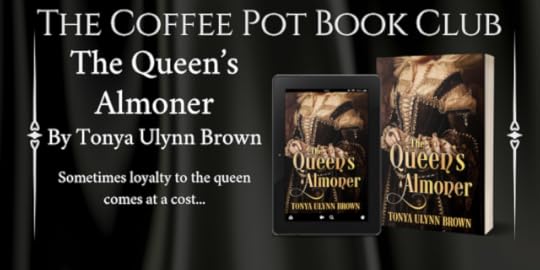
The Queen’s Almoner
By Tonya Ulynn Brown
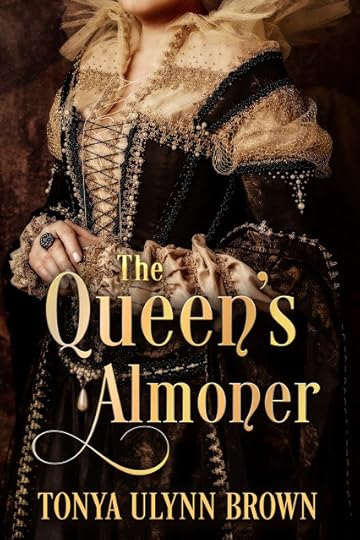
Sometimes loyalty to the queen comes at a cost.
Thomas Broune is a Reformer and childhood friend of the young queen, Mary Stuart. When Mary embarks on a new life in her estranged homeland of Scotland, Thomas is there to greet her and offer his renewed friendship. But the long-time friends grow closer, and Thomas realizes his innocent friendship has grown into something more. Yet he is a man of the cloth. Mary is the queen of the Scots. Both of them have obligations of an overwhelming magnitude: he to his conscience and she to her throne.
When he must choose between loyalty to his queen or his quiet life away from her court, he finds that the choice comes at a high price. Driven by a sense of obligation to protect those he loves, and crippled by his inability to do so, Thomas must come to terms with the choices he has made and find a peace that will finally lay his failures to rest.
Excerpt
“Thomas, you were always so full of good advice and instruction for me. But you know I never cared for all those useless facts. Why can’t you just enjoy the flowers?” she laughed. “Sometimes beauty does not need an explanation.”
“No, it does not,” I replied, looking away quickly. Then I explained, “I felt it was my duty, Your Majesty. From the day you were born until now, I have been mandated to look out for you and help you in any way, when it is within my power to do so. If that means providing you amusement with my useless facts as well, then so be it.”
This time she laughed out loud. A soft, yet hearty laugh that let me know that it was truly felt and not given out of obligation. She turned fully toward me then and I saw a glint of merriment in her eyes.
“You took that obligation very seriously if I do recall. I seem to remember a time when I had gotten injured and you carried me all the way home to get help, then didn’t leave my side until our mothers shooed you away.”
“You were bleeding,” I said in my defense.
I recalled very vividly the incident that she was referring to. On that particular day, we had decided to play in a cave I had found. I spread a blanket on the ground as the queen and the four Marys, set about dressing their dolls. A boy who had also accompanied us, dumped a satchel of apples out onto the blanket and then proceeded to draw out a small dagger that he had found. The girls’ eyes lit up when they saw the shiny object and the boy carelessly whisked it back and forth as if to fight some unseen enemy.
Later in the day, in the process of packing up, she scraped her arm on the tip of the boy’s dagger. Blood spurted all over her dress and the sight of it made Mary limp. She let out a small gasp before collapsing on the ground. I immediately grabbed the blanket and wrapped her arm as the girls began to wale. The boy, standing there stupidly, looked as if he himself could cry at any moment. He knew his fate once it was discovered that he had caused the young queen harm.
Returning to the conversation I said, “I’m the one who took us up to that cave. It was my obligation to make sure that no harm befell you while you were with me.”
“Yes, but you didn’t cause the injury. What was that boy’s name? Frederick? Francisco?”
“Ferdinand,” I supplied.
“Ferdinand! Yes, that was it.”
“Aye, and I took care of him when I saw him a day later.”
Her eyes grew round as goose eggs at that and she laughed delightfully. “What did you do, Thomas?”
“I snatched him up by the collar and shook him as hard as I could. I told him if he ever did something as stupid as that again I would have his head on a platter.”
Mary covered her mouth with her hand as she doubled over in laughter. “He was the Italian ambassador’s son. You could have been severely punished! I’m surprised he didn’t tattle on you.”
“That was a chance I had to take.” I fought to keep the corners of my mouth from curling up. She was getting too much enjoyment out of this, but I loved to see her delight. “Besides,” I continued, “I threatened him about that as well. I reminded him that it was his indiscretion that caused your injury, and if he told anyone about our conversation, that I would tell all I knew about how you got hurt.”
“Thomas!” she gasped.
“Aye, I felt bad about it later, but I didn’t tell him that. It was my task to protect you, so…I did what I had to do.”
Pick up your copy of
The Queen’s Almoner
Tonya Ulynn Brown

Tonya Ulynn Brown was born and raised in Columbus, Ohio. Although she has also lived in Indiana, Virginia, and Belarus, she now calls southeastern Ohio home. She spent her younger years right out of college, living in Europe and teaching English as second language. She attributes her time in Eastern Europe as being one of great personal growth, where her love for history, the classics, and all things European was born. Tonya holds a Master’s degree in Teaching and is now an elementary school teacher where she uses her love of history and reading to try to inspire younger generations to learn, explore and grow. Along with all the historical characters that she entertains in her head, she lives with her husband, two sons and a very naughty Springer Spaniel. Her mother has also joined their home, making for a cozy and complete little family.
Connect with Tonya: Website • Twitter • Facebook • Instagram • Pinterest.
June 29, 2020
Join me in conversation with actor and #HistoricalFiction author, Richard James @RichardNJames @SharpeBooks

A Conversation with actor and Historical Fiction author, Richard James
Please give a warm Coffee Pot Welcome to Historical Fiction author, Richard James.
 ‘Richard James as Sherlock Holmes’ photograph by Joanna Yates.
‘Richard James as Sherlock Holmes’ photograph by Joanna Yates.
Mary Anne: Hi Richard, it is so wonderful that you could join us today. Many people will recognise you from the stage, film and television, but you are also an award-winning playwright and author. Did your experience as an actor help you create the amazing historical settings and cast that can be found in your books?
Richard James: That’s a very good question! I suppose, as an actor, I’m always asking myself ‘why is my character doing this?’, which really helped me get under the skin of the characters in my books. I’m always looking for subtext, the currents beneath the water that I find so interesting.
Above all, though, the two strands of my career - being an actor and a writer - have both been about telling stories, whether on the stage or the page. Many readers have told me my novels are very filmic, very visual, and I suppose that’s because I can almost see them in front of me as I write, like looking through a camera. As an actor, I’m used to reading scripts, marking their beats and how to begin and end a scene. I even think of my books in terms of scenes rather than chapters and cast my characters from actors I know or have worked with!
Finally, acting is all about imagination. As a performer, I am tasked with imagining how my character might react in certain circumstances and relating that to the audience. The perfect training for writing a book, I’d say!
Mary Anne: The Head in the Ice is the first book in your fabulous Bowman Of The Yard series, could you tell us a little about your series and what inspired you to write it?
Richard James: The series is set throughout the year 1892, following Inspector Bowman’s discharge from a lunatic asylum. He is undergoing treatment for extreme melancholia following the death of his wife, a death for which he holds himself responsible. As the series progresses, we see him plunged back into some brutal investigations – including the discovery of a frozen head in the river Thames. Before long, he falls victim to his own fragile mental state.
A couple of years ago, I was lucky enough to be on a very long theatre tour. Despite performing in two shows a day, I managed to find the time to write the first book in the series, ‘The Head In The Ice.’ After almost five hundred performances, I needed something to break the feeling of Groundhog Day! Almost every chapter was written either on a train or in a dressing room. I knew at once it had to be a series and relished the idea of following the same cast of characters throughout one decisive year.
Mary Anne: What drew you to set your series in the Victorian era?
Richard James: I have long had a fascination with the Victorian era – or rather the literary version of it, which may not be quite the same thing. No one really believes that Conan Doyle’s London, for example, ever really existed but it’s a myth that we’ve all bought into; the foggy streets, the dark, forbidding alleyways. I think it’s almost like a folk memory and it’s one I really wanted to play with. I’ve long been a fan of the Sherlock Holmes stories (I’ve even played the great detective on stage) but wanted my central character to be more vulnerable, less sure of himself and, crucially, to evolve throughout the books.
It’s a period that lends itself to larger than life characters. I’m always drawn to them as an actor (for example, playing David Walliams’ ‘Awful Auntie’) and, now, as a writer. It was also an age of incredible industrialisation in which, it could be argued, a few people profited off the backs of the many poor. This seemed the perfect backdrop against which to set a detective series!
 Awful Auntie cast with David Walliams, photograph by Roberta Bellekom.
Awful Auntie cast with David Walliams, photograph by Roberta Bellekom.
Mary Anne: What were the challenges you faced in researching this period of history and were there any unexpected surprises?
Richard James: Because I’m not writing about the dim and distant past but an era that only drew to an end a little over a hundred years ago, there are plenty of resources to turn to. I discovered an online map published by the National Library of Scotland featuring maps from the period. Helpfully, it includes a transparency feature which enables you to look through the Victorian map to the streets as they look today. Certainly as far as London is concerned, I was amazed to see how little has changed. The street patterns remain the same in many places and even many buildings are still in place. I’m also lucky to live close enough to London that, if all else fails, I can easily hop on a train and take a look myself!
In the course of my research for the first book, I learned that my idea of how the Victorians treated their mentally ill was not quite as things had been. In fact, following the Lunacy Act of 1845, steps were taken to ensure their treatment was humane and based on a scientific approach. I had to deal with the fact that, whilst this was good news, it’s not narratively that interesting! However, I reasoned, for a man like Bowman, even the most progressive regime would be difficult to bear.
Mary Anne: What advice do you have for aspiring Historical Fiction authors?
Richard James: Create a world that people want to spend time in and a cast of characters they want to spend time with. Compose a compelling story that will force them onto the next chapter rather than put the book down.
Don’t be put off by writers who seem to write a book every month. Take your own time. But remember, finding the discipline to write is a common problem. It will take many hours of effort. As celebrated comedy screenwriter, Brian Clemens, would say, ‘Arse to chair, pen to paper!’
Mary Anne: Thank you so much for taking the time out of your day to chat with us about your wonderful series!
If you would like to find out more about The Head in the Ice and read an excerpt, then you know what to do — SCROLL DOWN!!
The Head In The Ice
A Bowman Of The Yard Investigation
By Richard James

Winter, 1892.
A woman’s head found in the River Thames.
Battling with feelings of guilt over his wife’s death - and having spent time recovering in an asylum - Detective Inspector George Bowman must join his colleagues, Sergeant Graves and Inspector Hicks, to discover the woman’s identity.
A deal struck with the editor of the Evening Standard to follow the investigation from within turns sour following a botched ambush on a suspect’s lair.
A false identification, a doomed visit to a Spiritualist Meeting and Graves' investigations into a ship called Nimrod all serve to bring Bowman closer to a revelation.
The investigation unfolds, but Graves and Hicks grow increasingly concerned at Bowman’s mental state.
A chase across the frozen streets of London leads to a final confrontation on the waters of The Thames, where Bowman must face the demons that haunt him to catch the killer
Praise for The Head In The Ice.
‘Wonderfully atmospheric, full of the thrills of Victorian London.’
Adam Croft.
'A genuinely impressive debut.'
Andrew Cartmel, The Vinyl Detective.
'Crime fiction with wit and twists.'
Richard Foreman, Raffles: The Complete Innings.
Excerpt
“It’s an obvious but unfortunate case of suicide.” Inspector Ignatius Hicks of Scotland Yard stood upon an upturned crate he had found beside the river and declaimed from a lofty height to anyone who cared to listen. As it happened, the crowd was sizable for so early in the morning. They had been drawn by the sight of a team of men, stripped to their shirtsleeves despite the cold, sawing and chiselling their way through the ice near the shore. With occasional shouts and curses, they ordered more tools be brought from the cart they had pulled down to the river’s edge. It was a curious spectacle in the harsh morning light, and one that attracted the attention of many on their way to work. Even the vagrants beneath Westminster Bridge had risen early to investigate.
The roofs and chimneys around them stood in sharp relief against a piercing blue sky where the rooks and pigeons wheeled. The sun, still low on the horizon, cast long shadows in the streets but even where it reached the ground unhindered, was of insufficient strength to offer any warmth.
Inspector Hicks was a large, bearded man muffled against the cold in a giant, calf length coat. He held a smoking pipe in a gloved hand the size of a large ham, and used it to punctuate his pronouncements as if this very action would lend them credulity. The motley gathering about him regarded him as nothing more than a circus turn.
Such was the scene that greeted Inspector George Bowman. His dark brows, jammed beneath a bowler hat, were knotted into a frown and his thin mouth was drawn down in an expression of concentration as he tried to keep his footing on the ice. The cold did not agree with him. Despite the application of several layers, a thick scarf and an extra muffler, Inspector Bowman felt frozen to his core. And he could no longer feel his feet.
“Happy New Year, sir.”
He was joined, squinting into the sun, by Sergeant Anthony Graves, a man whose surname was quite at odds with his naturally cheery disposition. A curly mop of blond hair framed his handsome, youthful face and he seemed not to mind the cold at all. He wore no hat and no gloves.
Bowman grunted in reply and nodded across to the gangly young man and his pretty girlfriend who stood shivering by the river’s edge. “Not for them, it isn’t,” he growled. “They found the body last night and raised the alarm. They just can’t tear themselves away.”
Graves followed his gaze. “Poor devils,” he said. “I’ve ordered some hot soup for the men. I dare say they won’t mind sharing it with them.”
“I’ve never known it so cold,” said Bowman, puffing on his hands in a futile attempt to restore feeling. “Will you take their statements?”
“I will. But I’ve no doubt Inspector Hicks has got the whole thing wrapped up by now.”
Bowman could tell Graves felt awkward in his presence. It was there in the little sideways glances he had afforded him during their conversation. Finally, his tall companion cleared his throat.
“Are you feeling quite well, sir?”
Bowman felt the skin on his neck begin to burn beneath his scarf. “I am well, thank you.”
It occurred to Bowman that this was the first time he had seen Sergeant Graves since the night of the incident. The mundanity of their conversation was a world away from their last meeting. Looking at Graves, Bowman could see that he had not changed a bit. His face still had the flush of youth, his eyes bright and inquisitive. For Bowman, however, a lifetime had passed. He felt he had aged ten years. Anthony Graves had seen it all. Indeed, he had held Bowman back as his wife lay trampled in the dirt. If he had been left alone to intervene as he had wished, Bowman would surely have died too. He had often wished it so.
“Well,” Graves stammered, clearly eager to put an end to the exchange as quickly as he could, “It’s nice to see you back, sir.”
As they talked, the men had reached the little audience that surrounded Hicks and, seeing them approach, the bearded inspector broke off from his performance.
“Ah, Bowman, so glad you could join us again.”
The implication in Hicks’ choice of words was harsh, thought Graves, and he winced at their cruelty. Unabashed, Hicks drew from his pipe then held it aloft in a dramatic fashion. “Listen and learn.” Bowman rolled his eyes and looked down to his feet as Hicks continued, opening his arms wide in an expansive gesture. His great voice boomed over the crowd. He would, thought Inspector Bowman, have made an impressive actor.
Pick up your copy of
The Head In The Ice
Only 0.99 on Kindle for a Limited Time
Read with

Add The Head In The Ice
To your ‘To-Read” list on
Goodreads
Richard James
 Richard James,
Richard James, photograph by Steve Ullathorne.
Richard James has been an actor for almost thirty years. He is most well known to viewers of a certain age for playing various regular and recurring roles on chidren’s television, including The Mysti Show, My Parents Are Aliens and MI High. He has also appeared on the big screen with the likes of Burt Reynolds and Helena Bonham Carter and toured the country in stage adaptations of David Walliams’ most popular books.
As a playwright, he has written almost thirty plays that are performed the world over, frequently winning awards at festivals and competitions.
The Bowman Of The Yard novels and short stories are his first as an author.
Find out more at his website, where you can also read his latest blogs and listen to the latest Bowman Of The Yard podcast. You can also follow Richard on Twitter or ‘like’ his page on Facebook.

June 28, 2020
Check out Maggie Richell-Davies fabulous book — The Servant #HistoricalFiction #mustread @maggiedavieswr1@SharpeBooks

The Servant
By Maggie Richell-Davies

1765.
London.
Young Hannah Hubert may be the granddaughter of a French merchant and the daughter of a Spitalfields silk weaver, but she has come down in the world.
Sent one spring day as maidservant to a disgraced aristocrat, she finds herself in a house full of mysteries - with a locked room and strange auctions being held behind closed doors.
As a servant, she has little power but - unknown to her employers - she can read. And it is only when she uses her education to uncover the secrets of the house, that she realises the peril she is in.
Hannah is unable to turn to the other servant, Peg, who is clearly terrified of their employers and keeps warning her to find alternative work.
But help might come from Thomas, the taciturn farmer delivering milk to the neighbourhood, or from Jack Twyford, a friendly young man apprenticed to his uncle’s bookselling business. Yet Thomas is still grieving for his late wife – and can she trust Jack, since his uncle is one of her master’s associates?
Hannah soon discovers damning evidence she cannot ignore.
She must act alone, but at what price?
Praise for The Servant
"A gripping immersive crime drama with a heroine you'll be rooting for from the first line. Highly recommended."
Imogen Robertson, author of Instruments of Darkness
Excerpt
‘Let’s have a proper look at you.’
I step within touching distance. The visitor has eaten something strong-smelling. Fragments are lodged between her teeth. And her breath, and what is happening, jolt me back to being ten years old.
Toasted cheese. The mouth-watering odour hit us as we were hustled into the room. Mary and I had been dragged from bed by one of the older girls and hurried, barefoot, to the overseer’s quarters. There was a stranger with her, in a satin gown too bright and young for her face. From the plates and porter bottles on the table, they had just shared a meal.
‘The dark haired one is the looker, with those striking green eyes,’ said the visitor. ‘Hannah Hubert, did you say?’
‘Yes. A handful, though.’
The stranger yanked at my shift and, when I resisted, gave me a slap.
‘Keep still.’
Fingers searched, and I bared my teeth.
The blow from the overseer knocked me to the hearthrug. Inches from my face was a brass toasting fork and I lunged for it.
‘Don’t!’ A foot stamped on my wrist. ‘Troublesome little tyke.’
I froze, the taste in my mouth bitter. Knowing I could be handled by strangers, like a donkey at a horse fair, and do nothing.
‘I’ll take the other one.’ The stranger shoved a tattered shawl at the whimpering Mary, sounding bored. ‘Can’t be doing with trouble.’
‘Want me to send for her boots?’
‘We are not going far. Stones and filth under those bare feet will fix her mind on what running off would mean.’
‘The parents are dead?’ The voice is curt, dragging me back to Mistress Buttermere’s elegant parlour. ‘You are sure?’
In the chair opposite my mistress, the visitor is ramrod-straight. Hands twisting like snakes in the lap of her black gown. A figure fashioned from whalebone and iron. She means me harm, I know it. The eyes studying me are sharp as a skinning knife.
Pick up your copy of
The Servant
Add The Servant to your
‘to-read’ list
on

Maggie Richell-Davies

Maggie was born in Newcastle and has a first-class honours degree from the Open University.
In March, her debut novel, The Servant, won the Historical Writers’ Association 2020 Unpublished Novel Award, together with a publishing contract from Sharpe Books.
The story was inspired by a visit to London’s Foundling Hospital Museum, with its emotive displays of bits of ribbon or lace left as tokens by desperate mothers in the hope that they might, one day, be able to retrieve their precious child.
Maggie has had short stories published and been shortlisted and longlisted for a number of awards. She is a member of the Historical Writers’ Association and of the Romantic Novelists’ Association.
She currently lives in Royal Tunbridge Wells with her husband, but also spent a number of years in Peru, Africa and the United States.
Maggie has a passion for historic houses, having lived for twenty years in a timbered farmhouse built around the time of the English Civil War which provided the inspiration for the home of the dairy farmer in her story.
When not tending their garden, she and her husband enjoy exploring historic sites and houses in the south of England.
Connect with Maggie: Website • Twitter.

June 25, 2020
Join me in conversation with Historical Fiction author, Richard Foreman. Grab your copy of Richard's fabulous book —Besieged, for only 0.99 on Kindle for a Limited Time. #HistoricalFiction #Crusades #interview @SharpeBooks

A Conversation with Historical Fiction author, Richard Foreman
Please give a warm Coffee Pot welcome to Richard Foreman.
Mary Anne: Congratulations on your new book release, Richard, and welcome back to The Coffee Pot Book Club Blog.
Besieged is the second book in your fabulous The First Crusade series, could you tell us a little about your series and what inspired you to write it?
Richard Foreman: After finishing of the Spies of Rome series I decided to return to the medieval period, having enjoyed writing The Band of Brothers books, about Henry V.
The First Crusade – and particularly the events surrounding the siege of Antioch – are sufficiently dramatic, without having to fictionalise them too much. You could say I was inspired by the attraction of being lazy. The story contains a clash of civilisations, suffering, heroism, reversals of fortune and a victory against all odds. History provided a great plot and cast of characters, so I didn’t have to.
The Battle of Antioch should be as iconic as Agincourt and Rourke’s Drift, in some ways. The First Crusade is a story of God and war, fear and faith. Although the story of Antioch can often be dark and depressing, as a writer it’s interesting - and even fun - to address the interplay between such subjects.
I wanted to shine a light on the epochal moment in history, which still has a legacy in Europe and the Middle East today, and introduce readers to figures such as Bohemond of Taranto and Bishop Adhemar. But as much as I may have given myself a slight educational brief when producing Besieged, far more importantly I have aimed to entertain.
Thankfully the first book, Siege, was a great success. The novel hit the highs of being in the top 100 of Amazon and was number one in the Medieval History Chart. Part of the inspiration of writing second book is that people enjoyed the first one in series.
Mary Anne: I adored Siege (if you missed it, you can read The Coffee Pot Review HERE!) and I am not at all surprised by its success. But a huge congratulations, anyway.
What were the challenges you faced in researching this period of history and were there any unexpected surprises?
Richard Foreman: I am fortunate enough to know a number of medieval historians, who I chatted with first before commencing the project in earnest. They helped me to focus on certain themes and events. There are several excellent history books published, such as The First Crusade by Thomas Asbridge and Steven Runciman’s series on the crusades, which served as a source of information and inspiration too. The challenge, if it can be called one, was deciding what to leave out. I could have written a novel twice as long, but less is sometimes more. In terms of unexpected surprises, I was grateful that the sources provided so much insight and colour. For instance, such was the degree of starvation in Antioch that pilgrims would pick through manure for pieces of grain to eat. I am not sure I would have been able to make that up. Or have wanted to have made that up, without having to poke out my mind’s eye afterwards.
Mary Anne: It is those little insights, such as picking through manure to find gain, which I think really gives a book authenticity.
Can you describe what a typical writing day look like for you?
Richard Foreman: I do not really have a typical day, for good or ill. I certainly get more writing done over the weekends, as the day job of running a publishing house takes up most of my time during the week. I tend to write first thing when the sun comes up during the summer months though. It’s also the smallest of small consolations, but lockdown has meant I have been able to write more and comfortably hit deadlines.
Mary Anne: What do you think is the most challenging aspect of writing Historical Fiction?
Richard Foreman: It’s not a challenge, but it’s important to ensure you choose the right project to move forward with. If you do, you will be more engaged with the book and therefore more likely to finish any novel and engage readers too. When I initially started writing historical fiction, I think I was guilty of over researching books. History should rarely be at the expense of story – although the trick is to marry up both. The best historians will duly admit to being storytellers too. There are plenty of exceptions to the rule, but if you aspire to be a professional writer nowadays you need to write at least one novel a year – and meet the challenge of being prolific.
Mary Anne: What advice do you have for aspiring Historical Fiction authors?
The most important thing an aspiring historical writer can do is read. The likes of Bernard Cornwell, George Macdonald Fraser and Hilary Mantel can teach a novelist far more about their craft than any creative writing tutor. As well as enjoying reading, read with a trade eye in relation to structure and style. Be aware of what the market wants. Most first books take a while to write. I would say to aspiring novelists however that it does get easier. You will learn to focus your research, find a voice and edit yourself – so eventually you should become a better and more prolific writer. There is light at the end of the tunnel, or at the very least a lighter shade of grey.
Wearing my publisher’s hat, I would stress to aspiring novelists to make sure you read submission requirements when approaching agents and publishers. It’s incredibly difficult to secure an agent and publisher in the current climate, but it’s also far from impossible. Be polite and professional in your dealings. Do not give up if you exhaust the options of finding an agent or publisher too. Lots of writers make money and produce good books via self-publishing. If you have written a manuscript that you are pleased with, then it shouldn’t just remain in the drawer.
Sharpe Books specialises in publishing historical fiction, by debut and established writers. I would recommend getting in touch if you have written in similar periods and genres to the titles on our list.
In short, keep on keeping on – like the crusaders.
Mary Anne: That is such great advice, thank you! And thank you also for coming onto the blog and chatting with us today.
If you would like to find out more about Richard and his books, then you know what to do — SCROLL DOWN!
Richard Foreman's new bestselling series on the First Crusade provides an entertaining insight into history - and the significant players in the armed pilgrimage, including Bohemond of Taranto and Bishop Adhemar of Le Puy. Foreman shines a light on the epochal moment, with humour and humanity, which still shapes the story of Europe and the Middle East today.
Besieged
(The First Crusade Book 2)
By Richard Foreman
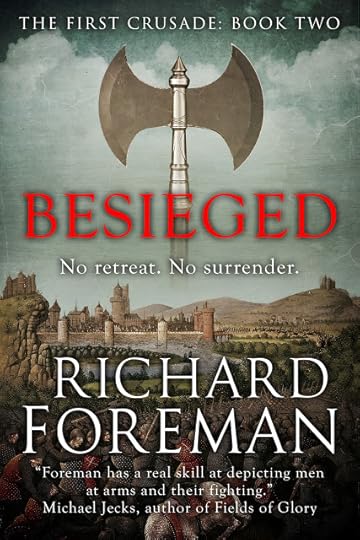
1098.
Antioch.
The besiegers have become the besieged.
Kerbogha the Dreadful and his grand army intend to surround and starve their enemies.
The crusaders need a miracle. But they may have found one in the shape of the Holy Lance.
Bohemond of Taranto realises that the pilgrims must fight or die.
But to fight they must know their enemy. Bohemond instructs Edward Kemp, an English knight, to gather intelligence on Kerbogha and the Muslim army. But in attempting to save the crusaders, Edward may damn himself.
Triumph and tragedy await on the plains of Antioch, where the course of the crusade - and history - will be altered forever.
Praise for Besieged: The First Crusade
"Richard Foreman is a writer who is as happy in Roman Britain as he is in Medieval Antioch, as this story shows... Richard Foreman has a real skill at depicting men at arms and their fighting."
Michael Jecks, Pilgrim's War.
Richard Foreman’s latest book, Besieged, is currently available on Special Promotion for 99c/p.
Grab your copy today!
Add Besieged to your
"to-read" list
on
Catch up with Book 1 of The First Crusade series
Siege
(The First Crusade, Book One)
By Richard Foreman
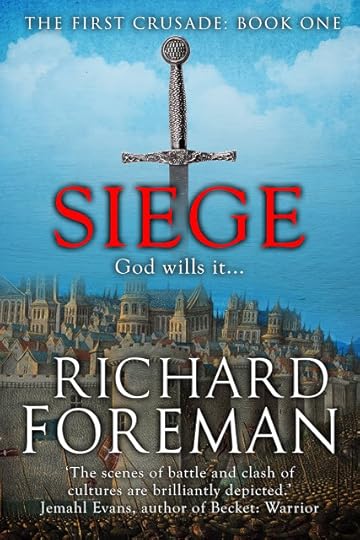
1098.
The crusader army still stands outside Antioch. Starving. Deserting.
An enemy force, led by Kerbogha of Mosul, is days away from relieving the walled city.
Bohemond of Taranto calls upon the English knight, Edward Kemp, to meet with an agent, who is willing to provide the Norman prince with access to Antioch.
But Bohemond is not alone in wishing to capture and lay claim to the prize. Edward must contend with enemies in his own camp.
Should the knight's mission fail, then so may the entire campaign.
Antioch must fall.
The Coffee Pot Book Club
★★★★★
Highly Recommended
Read the full review HERE!
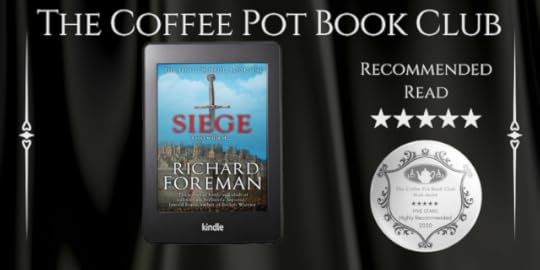
Check out Richard’s backlist for more great deals HERE!
Richard Foreman
Richard Foreman is the bestselling author of numerous historical series set during the Roman Republic and Roman Empire, including the Augustus Caesar books, Sword of Empire and Sword of Rome. He is also the author Warsaw, Raffles: The Complete Innings and Band of Brothers, a series charting the story of Henry V and the Agincourt campaign. He lives in London.
Praise for Richard Foreman's Books
Siege
(The First Crusade Book #1)
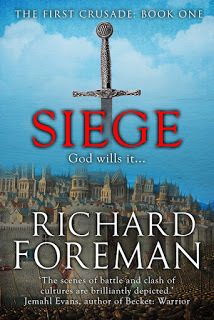
"A really good read for anyone interested in the First Crusade. Tight and fast-paced, the author's beguiling sense of setting combines with strong characterisation to make Siege a rollicking yarn."
Richard Woodman, Sword of State.
"Siege is a very human story, set amongst the mess and destruction of a mad war. The author tells a swift, enthralling tale, enriched with historical detail and believable, engaging characters. Highly recommend."
J. A. Ironside, The King's Knight.
Spies of Rome
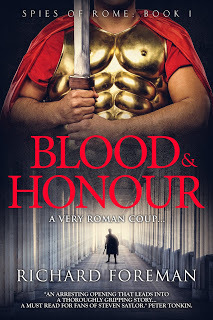 "A masterful and evocative depiction of a fledgling imperial Rome fraught with intrigue and at war with itself. The story and characters are as striking as the graffiti that adorns the violent city’s walls during Augustus' rise."Steven Veerapen, author of The Abbey Close."An arresting opening that leads into a thoroughly gripping story. Impressive research and understanding of the period allows Richard Foreman to move so seamlessly and effectively from historical epic to historical detective thriller. A must read for fans of Steven Saylor." Peter Tonkin, author of The Ides.
"A masterful and evocative depiction of a fledgling imperial Rome fraught with intrigue and at war with itself. The story and characters are as striking as the graffiti that adorns the violent city’s walls during Augustus' rise."Steven Veerapen, author of The Abbey Close."An arresting opening that leads into a thoroughly gripping story. Impressive research and understanding of the period allows Richard Foreman to move so seamlessly and effectively from historical epic to historical detective thriller. A must read for fans of Steven Saylor." Peter Tonkin, author of The Ides.
Amazon
Augustus: Son of Rome
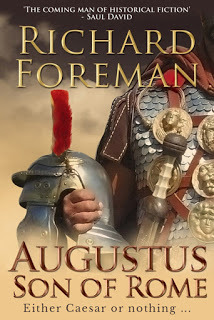
'Augustus: Son of Rome forges action and adventure with politics and philosophy. This superb story is drenched in both blood and wisdom - and puts Foreman on the map as the coming man of historical fiction’.Saul David, Author of the Zulu Hart series.
Amazon
Raffles:
The Complete Innings

‘Classy, humorous and surprisingly touching tales of cricket, friendship and crime.’David Blackburn, The Spectator.
Amazon
Band of Brothers:
The Complete Campaigns
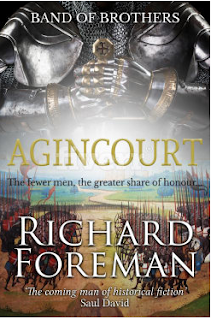 'Escapism at its best... A great read that tells much about the style of war and how the individuals fought.'Michael Jecks.'A rattling good yarn, requiring only the minimum of suspension of belief, and leaves one eagerly anticipating the next instalment of the adventures of the team as they accompany the King to Harfleur.' Major Gordon Corrigan, author of A Great and Glorious Adventure: A Military History of the Hundred Years War.
'Escapism at its best... A great read that tells much about the style of war and how the individuals fought.'Michael Jecks.'A rattling good yarn, requiring only the minimum of suspension of belief, and leaves one eagerly anticipating the next instalment of the adventures of the team as they accompany the King to Harfleur.' Major Gordon Corrigan, author of A Great and Glorious Adventure: A Military History of the Hundred Years War.Amazon
Warsaw
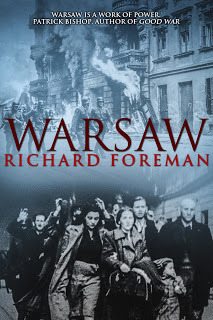
"Warsaw is a work of power. It has the authentic feeling that pulses from an important book. The meticulous research and psychological insights light up one of the most ghastly episodes in the history of man's inhumanity to man."Patrick Bishop, author of Fighter Boys and A Good War.
Amazon
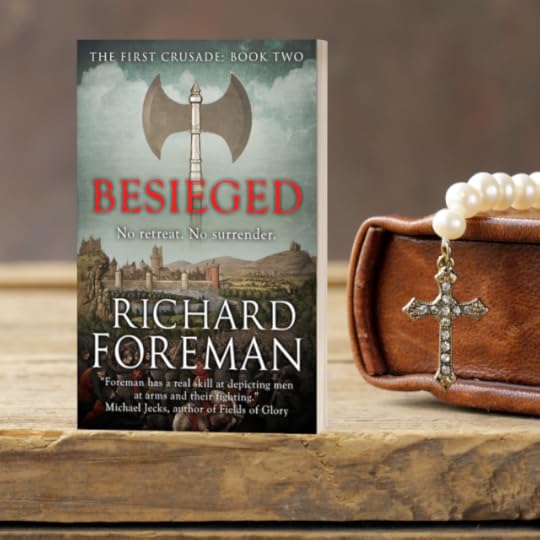
The Coffee Pot Book Club
...more
- Mary Anne Yarde's profile
- 159 followers




